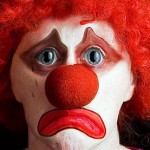Comic genius is a rare gift,
Why does it so often seem accompanied by depression?
 Regular listeners of the Sacramento based Rob, Arnie and Dawn morning radio show were left puzzled by the show’s mystery disappearance during the week of October 22nd. They were only a little less puzzled by the reappearance of the show on October 30th minus co-host and stalwart funny-man Arnie.
Regular listeners of the Sacramento based Rob, Arnie and Dawn morning radio show were left puzzled by the show’s mystery disappearance during the week of October 22nd. They were only a little less puzzled by the reappearance of the show on October 30th minus co-host and stalwart funny-man Arnie.
No less puzzled due to the unrevealing explanation Arnie offered in a statement on their web-site:-
As many of you know I have battled demons before in my life, but recently a new problem that I had no idea I had, took over and it overwhelmed me and sent me to a very dark place.
For a forty-something, ex- alcoholic, clinically obese, tobacco chewing man going through a difficult divorce the possibilities are endless of course; however its not so much the “problem” that sets me thinking as the “dark place”
Plague
Many of us can rattle off the names of half-a-dozen depressive funny-men without thinking. I first became aware of this connection in my teenage years when I found out about the suicide of Tony Hancock (well before my time) and Kenneth Williams (which wasn’t). Other battlers with Dark Places from a similar generation, such as Jimmy Edwards, Frankie Howerd and Bill Oddie come easily to mind too. That’s before we touch the more recent crop of comic talents such as Paul Merton and Hugh Laurie.
Perspective
As human beings we tend to ascribe too much significance to the unusual and too little to the mundane. These names and the others that spring easily to mind are still a drop in the ocean of people happily and contentedly working away in the comedy business both in front of the audience and behind the scenes.
Could this simply be perspective bias? Perhaps there are really no more depressive comics than there are depressive baristas and barmen?
Pressure
This problem is of course not limited to comedy. A quick Google search for depression throws up a mountain of household names from all walks of public life who have battled their particular demons, successfully or otherwise. If we expand our search to other personal problems such as addiction the list becomes overwhelming.
Survival of the fittest has evolved in all of us a drive to achieve some standing within our communities and the respect of our peer groups, but the audience for those in public life today is so much larger than evolution has equipped us for. When your role in life is to perform for an audience, an audience of millions is not an experience Mother Nature has introduced us to at evolution’s pace.
Some may argue this also applies to the unprecedented media intrusion into the personal lives of public figures. I’m in no way convinced by this though. We evolved in much tighter communities where secrets about our lives were surely harder to keep than they are now. However, perhaps the looser bonds of modern society ill-prepare us for that intrusion. Modern society allows us to grow up with an unreasonable expectation of control over what the world sees and what we can keep hidden.
If you are blessed with a natural talent to excel in a particular area you are also cursed with the expectation to continue to excel in a talent you may poorly understand. Being lauded for something you have elected to do and worked to achieve, for something you have done as opposed to something you simply are, is so much easier to comprehend, to understand and to manage. To be lionised for simply being yourself denies you the security of knowing that you can keep on doing it. A cabinetmaker can take great comfort in the plaudits for his work because he knows how to repeat it. Not so the artist, composer or comedian.
Palliative
Positivity counters negativity, joy counters pain and humour counters depression. It’s understandable that someone with a difficult past, or difficult present may cultivate humour to excess as their way of dealing with those feelings and thus, in some cases, come to excel at it.
This offers convenient explanations for some of our roll call. Jimmy Edwards and Kenneth Williams for example were famously troubled by their sexuality. But the majority of those names, at least as far as we know, have no such back-story to satisfy us.
Performance
A depressed barista can still turn up at Starbucks in the morning and serve coffee. A depressed computer programmer can still turn up to their desk and write software. A depressed toilet cleaner can still scrub a U-bend.
Not so for the comedian though and perhaps this is the simple reason why depression appears to afflict them more. Their job isn’t what they do, it’s who they are in a very deep and fundamental way. If comedy was formulaic, a set of rules we could all follow, in response to A say B, then we’d all be masters of the art and computers would be writing our sit-coms.
Humour is as fundamental to our natures as love and just as hard to fake. If you’re not feeling it, you’re not feeling it. You can’t just turn up at your desk and put the hours in. If you’re deeply depressed, you’re out of the game.
And perhaps this is why it seems so many funny-men are afflicted with depression. Comedy is, after all, a career the depressive can’t always hide behind.